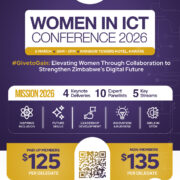ZB Financial Holdings has launched international cards and payments services in partnership with Mastercard, expanding its existing offerings beyond its current VISA and pushing the frontier of financial inclusion and e-commerce.
The bank unveiled five new Mastercard cards and upgraded its acquiring infrastructure to process international payments across its Point-of-Sale (POS) machines, ATMs, and online platforms, making it easier for both local and global customers to transact.
ZB Bank CEO Elisha Chibvuri said the initiative marks a major shift in how Zimbabweans can engage with global financial systems.
By Ruvarashe Gora
The Mastercard suite includes a Prepaid Card, Standard Debit Card, Gold Debit Card, Private Banking Card, and a Commercial Credit Card, each tailored to different segments, from informal traders and students to corporate clients and executives.
The prepaid card is designed for the unbanked, including youth and cross-border traders, with wallets in USD and South African Rand already active. A Zimbabwean Dollar (ZWG) wallet is expected soon, making it the first tri-currency card in the country.
“We built this with every Zimbabwean in mind, from students buying books online, to traders paying suppliers in South Africa,” said Chibvuri. “It’s practical banking for real people.”
At the higher end, the Commercial Credit Card targets logistics and travel-heavy businesses, offering real-time expense tracking, limits, fraud protection, and less paperwork. Other card benefits include airport lounge access, hotel and car rental discounts, and concierge services for medical travel.
Beyond card issuance, ZB also announced its expansion into merchant acquiring, allowing local businesses to accept Mastercard and Visa payments on POS terminals and through the Smile and Pay gateway, which now supports e-commerce. Tourists and diaspora Zimbabweans can now use their international cards for everyday transactions locally.
“This is a game changer for tourism, e-commerce, and even small businesses trying to sell across borders,” said Chibvuri.
The move aligns with regional trends, as banks across Africa invest in digital channels to reach underserved communities and meet rising demand for mobile and online payments.
While other local banks have digitized select services, ZB’s Mastercard suite stands out for its focus on inclusivity and multi-currency flexibility, a potential model for future banking innovation in Zimbabwe.
As the country navigates currency volatility and inflationary pressure, flexible financial tools like these may help ease transaction friction and expand access to global markets.














Comments